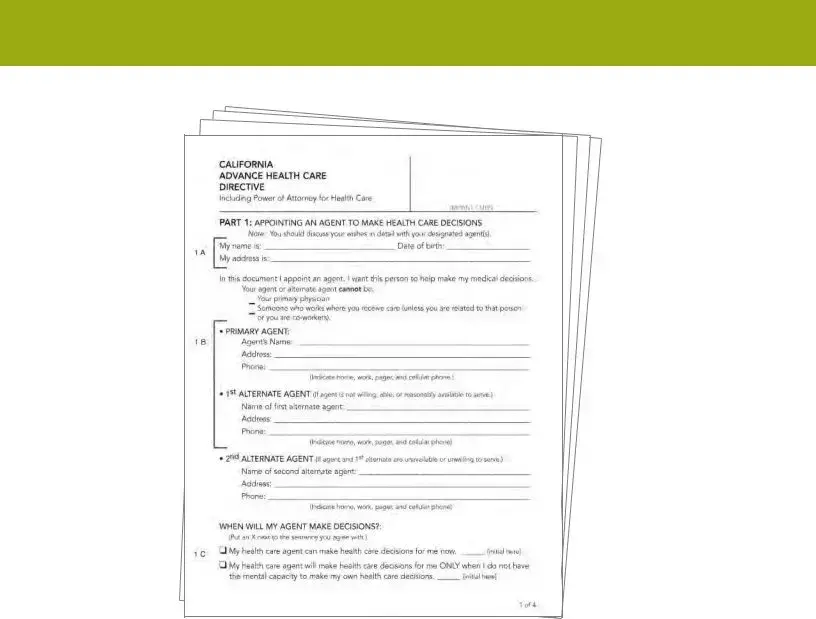Fill Out Your Kaiser Health Care Directive Form
Creating a plan for your health care wishes can be an invaluable tool for both you and your loved ones. The Kaiser Health Care Directive form empowers you to communicate your preferences regarding medical decisions when you may no longer be able to advocate for yourself. This important legal document enables you to appoint a trusted individual, known as a health care agent, who will collaborate with medical professionals to ensure your choices are honored. Alongside designating your agent, the form allows you to articulate your specific health care desires, including choices about life-sustaining treatments and organ donation. Unlike the older Durable Power of Attorney for Health Care, the Advance Health Care Directive does not have an expiration date, ensuring that your directives remain in effect until you decide to revoke or modify them. Emphasizing the significance of discussing these sensitive topics with family and medical providers before a crisis arises, the directive helps reduce confusion and prevents potential disagreements among loved ones. In essence, it serves as a safeguard for your wishes, providing clarity to those you care about during challenging times.
Kaiser Health Care Directive Example

COMMUNICATE YOUR
HEALTH CARE WISHES.
CALIFORNIA ADVANCE HEALTH CARE DIRECTIVE KIT

CALIFORNIA ADVANCE HEALTH CARE DIRECTIVE
Your Packet Includes:
■Introduction to advance health care directives |
page 2 |
■Decide what is important to you |
page 9 |
■“My Health Care Choices” (optional supplement) |
page 11 |
■Step by step instructions for completing |
page 15 |
the “Advance Health Care Directive” |
|
■”Advance Health Care Directive” Legal Form
■Roles and responsibilities of the health care agent
page 21 page 25
1

INTRODUCTION
What is an Advance Health Care Directive (AHCD)?
If you are able, it is up to you to make all of your health care decisions. However, if you are unable or unwilling to make decisions, the law allows you to choose someone else to make health care decisions on your behalf.
An Advance Health Care Directive or AHCD is a legal document. It allows you to tell others what kind of health care you want to receive when you are too sick and unable to make decisions about your care.
The AHCD form also lets you identify the person(s) you choose who will work with your doctors and others to help ensure that your wishes about your health care are carried out. This person is called the health care agent.
You can also write down your wishes about organ donation and identify your personal care physician.
Unlike the earlier Durable Power of Attorney for Health Care (DPAHC), the Advance Health Care Directive does not expire. It will stay in effect until you revoke or change it. (Please note: If you have a signed DPAHC that was valid before July 1, 2000, it remains valid.)
Anyone age 18 years or older who is able to make his or her own health care decisions can establish an Advance Health Care Directive.
2

Why is it so important to have a signed Advance Health Care Directive?
Completing an AHCD can help your loved ones and your doctors understand your wishes concerning your health care. It will help lessen confusion and disagreement over your personal wishes and choices concerning your care at a time when you are too sick to make those choices yourself. So it’s important to talk about your wishes with your doctor, family, and close friends now, before you are too sick to talk or write about issues such as your quality of life, your choices about treatment, and how you would want to spend your final days.
If this is a legal document, will I need to see a lawyer to complete it?
No, you do not need a lawyer to complete an AHCD.
3

Why do I need to choose an agent?
If a situation arises in which you are no longer able to make health care decisions for yourself, family and other loved ones may become involved in making those decisions. Even when you write down and share your wishes with others close to you, occasionally people will disagree about what may be the best care for you. This is why you need to select one person to help ensure your wishes about your care are honored and to make any additional heath care decisions for you. It is best to choose a close relative or personal friend whom you trust, who understands your values, and who will agree to honor your wishes. You can also name another person(s) to act on your behalf in case the first person you select is no longer available or is unable to make health care decisions for you. These people are called the alternate agent(s). You can also indicate if there is a specific person(s) you do not want to be involved in making decisions for you.
If you are concerned and want to spare loved ones from the burden of decision- making, you may want to consider choosing a CLOSE FRIEND who understands your wishes and who can act as your agent.
Try to select an agent who is most likely to be comfortable carrying out your wishes about your care. Make your wishes known to him or her, as well as to everyone else who is likely to be close to you in such circumstances. This is especially important if you think people may not agree or there could be conflict about your care.
4

What if I don’t choose a health care agent?
If you became unable to make your own decisions, your doctors will ask your closest family members to act on your behalf. If family members cannot agree and decisions cannot be reached in a timely fashion, emotional stress and conflicts among family members can result. Also, if there is no one willing or available to make health care decisions on your behalf, a court appointed representative who doesn’t necessarily know your values and wishes may have to make critical care decisions for you.
What types of decisions can my health care agent make?
Your agent becomes your representative. He or she participates in medical decisions by representing your interests. This includes decisions like:
•Changing your doctor, nurse, or social worker.
•Where you receive medical care (at home, or in a hospital).
•Your medications, tests, and medical treatment.
•What happens to your body and organs after you die.
Becoming your agent does not mean that he/she assumes financial responsibility for you.
Your health care agent acts for you and makes all health care decisions on your behalf, unless you limit his or her authority.
5

Who cannot be my health care agent?
Your health care agent cannot be:
•The doctor who is managing your care.
•An operator or employee of a community care facility or a residential care facility where you are receiving care.
•An employee of the health care institution where you are receiving care, unless that person is related to you by blood, marriage, or adoption.
When does my health care agent make decisions for me?
Your health care agent will usually make decisions only if you are unable to make them yourself, such as if you have lost the ability to understand things.
You can appoint your health care agent to act on your behalf at any time, even when you are still capable of making your own decisions, but you no longer want to make decisions about your care.
If you do not have an Advance Directive and suddenly become ill, you can appoint a temporary health care agent to let the doctor know who you want to make decisions for you. Your oral instruction is just as valid as a written one.
6

What if I want to provide specific health care instructions that are not on the AHCD form?
You can write more detailed health care instructions on additional sheets of paper, or you can use the communication form, “My Health Care Choices,” which was designed to help you clarify your wishes for your doctor and loved ones. (See pages
Attach your instruction sheet(s) to the Advance Health Care Directive and write the number of pages you are attaching.
Sign and date the attachments and have them witnessed or notarized at the same time you have your form witnessed or notarized.
Provide your health care agent(s) and doctor(s) with a copy of your specific health care instruction sheet(s) to ensure they understand your wishes.
6
You must sign the form.
Who needs to sign this form?
Have two WITNESSES sign the form. If you do not have witnesses, you need a Notary Public. A notary public’s job is to make sure you are the person who is signing the form.
Your witnesses must be over the age of 18, they must know you, and must either be present when you sign the form or, believe you are the person who signed the form.
YOUR WITNESSES CANNOT BE:
•Your health care provider or an employee of your health care provider.
•Your agent or alternate agent(s).
•An operator or employee of an operator of a community care or residential care facility.
At least one of the witnesses cannot be related to you by blood, marriage or adoption, be named in your will, or be someone who would benefit from your estate.
7

What should I do after I have my AHCD signed and witnessed?
•Make several copies of the form. Keep the original in a place where you can find it easily, and tell others where you put the forms. Do not keep your AHCD in a safe deposit box because other people may need to find it quickly in an emergency.
•Return the original signed and witnessed form to your doctor at your next visit. Your doctor will include it in your medical records.
•Give photocopies to your agent and alternate agent (s). Be sure that everyone who might be involved with your health care, such as your family, clergy, or friends has a copy. Photocopies are just as valid as the original.
•Make a list of all the people and facilities who receive copies of your AHCD.
•Keep a copy for yourself in a visible,
•Take a copy of the form with you if you are going to be admitted to a hospital, nursing home, or other health care facility.
What if I change my mind after completing my AHCD?
You can change or cancel your AHCD at any time. Remember to get back all the old forms and replace them with your new AHCD forms.
Where can I find more information about
Advance Health Care Directives?
•Contact your local Kaiser Permanente Health Education Center or Department.
•Connect to our Web site at kp.org and enter “writing an advance directive” in the search box.
•You can also visit your doctor’s home page at kp.org/mydoctor if you are a Kaiser Foundation Health Plan member in Northern California. Go to the “Health Information and Resources” section on the left navigation bar, then click “advance care planning.”
8

DECIDE WHAT IS
IMPORTANT TO YOU
The following information can help you decide on the type of care that is right for you in case you become seriously ill or come to the end of your life. Use the
attached PERSONAL HEALTH CARE INSTRUCTIONS COMMUNICATION FORM to share your
wishes with your health care agent, other loved ones, and your health care providers.
Your Quality of Life, Values, and Decisions – An important step in helping your agent understand your wishes is to communicate what gives value to your life. There are many things to consider. Be sure to tell your agent your beliefs about serious illnesses and death. If you were found to have a serious illness, to what extent do you want to be treated? Do you want to be on life support?
Treatment choices – It is important to think about different situations where you would need treatment. Think about what types of treatment you would want for sudden illness, for example, a heart attack, or for an illness that could end your life, such as cancer.
For each illness, think about what type of treatment you would want. Be sure to communicate this to your agent.
Examples of Life Support Treatments:
CPR or cardiopulmonary resuscitation – when your heart stops
cardio = heart |
pulmonary = lungs |
resuscitation = try to restart |
This kind of treatment involves all of these actions:
•Pressing hard on your chest to try to pump the blood, sometimes so forcefully that it breaks ribs.
•Using electrical shocks to try to restore heart beat.
•Placing a tube into your windpipe attached to a bag to pump air into your lungs.
•Injecting medicines into your veins.
9
Form Characteristics
| Fact Name | Fact Detail |
|---|---|
| Definition | An Advance Health Care Directive (AHCD) is a legal document allowing you to express your health care wishes when you cannot make decisions for yourself. |
| Health Care Agent | The AHCD enables you to appoint a health care agent to make decisions about your care if you are unable to do so. |
| Duration | Unlike the earlier Durable Power of Attorney for Health Care, an AHCD does not expire and remains effective until you revoke it. |
| Eligibility | Any individual aged 18 or older, who can make their own health care decisions, can establish an AHCD. |
| Importance | Having a signed AHCD helps to clarify your health care wishes, reducing potential confusion and disagreements among family members during critical times. |
| No Lawyer Required | You do not need to consult a lawyer to complete your AHCD. It is designed for individuals to understand and fill out independently. |
| Alternate Agents | You can designate alternate agents to make health care decisions if your primary choice is unavailable. |
| Organ Donation Wishes | The AHCD allows you to specify your wishes regarding organ donation alongside your health care preferences. |
| Governing Law | The AHCD follows California law, particularly under the California Probate Code Section 4600-4806. |
Guidelines on Utilizing Kaiser Health Care Directive
Filling out the Kaiser Health Care Directive form allows you to communicate your health care wishes clearly. This process ensures that your preferences are known, even if you cannot express them later. Below are the steps to complete the form.
- Read the entire Kaiser Health Care Directive form carefully to understand its purpose and your options.
- Begin with the section titled “Decide what is important to you.” Think about your values and health care preferences.
- Identify your health care agent. Choose someone you trust to represent your wishes and fill out their information in the designated section.
- Consider naming alternate agents in case your primary agent is unavailable. Provide their details as required.
- Clearly outline your health care choices. Use the space provided to express specific treatments or interventions you want or do not want.
- If applicable, write any wishes regarding organ donation in the specified area. Make sure this aligns with your values.
- Designate your personal care physician if you have one. This helps your agent understand whom to consult about your health care.
- Sign and date the form in the presence of witnesses. Ensure that you follow your state's requirements for witness signatures.
- Provide copies of the completed form to your health care agent, personal care physician, and family members if applicable.
- Store the original form in a safe but accessible place. Inform your agent where to find it if necessary.
What You Should Know About This Form
What is the Kaiser Health Care Directive form?
The Kaiser Health Care Directive form, also known as an Advance Health Care Directive (AHCD), is a legal document that allows individuals to specify their healthcare wishes when they are unable to make decisions for themselves. This form helps communicate your preferences regarding medical treatments and care, ensuring that your wishes are respected. It designates a health care agent—someone you trust—to make decisions on your behalf if needed.
Why is having a signed Advance Health Care Directive important?
Having a signed Advance Health Care Directive is crucial because it provides clarity for your loved ones and medical professionals about your healthcare preferences. During critical times, family members may struggle with making decisions if they are unsure of your wishes. By outlining your choices in advance, you reduce the chances of confusion or disagreement, making it easier for everyone involved to understand and comply with what you want.
Do I need a lawyer to complete the Advance Health Care Directive?
No, there is no requirement to see a lawyer when filling out the Kaiser Health Care Directive form. The instructions provided within the packet guide you through the process of completing the document on your own. However, if you have specific legal questions or complex situations, consulting a lawyer may still be beneficial but is not necessary for the completion of the form itself.
How do I choose a health care agent, and why is it necessary?
Choosing a health care agent is vital because this person will make decisions for you if you cannot. Pick someone who knows you well, understands your values, and is capable of following through on your wishes. Ideally, this should be a trusted family member or close friend who can advocate for you under potentially stressful circumstances. Additionally, you can name alternate agents in case your primary choice is unavailable.
Can I change or revoke my Advance Health Care Directive once it’s completed?
Yes, you can change or revoke your Advance Health Care Directive at any time. Your wishes can evolve, and the law provides you with the ability to update the document as needed. Always ensure that your healthcare agent and significant people in your life are informed of any changes you make to the directive.
What can I include in my Advance Health Care Directive?
You can express a variety of health care wishes in your Advance Health Care Directive. This includes preferences about specific medical treatments, end-of-life care, organ donation, and designating your personal care physician. The document serves as a comprehensive guide for your health care agent and medical providers regarding the types of care you desire when you cannot communicate those choices yourself.
Common mistakes
Completing the Kaiser Health Care Directive form can be a profound step toward ensuring your health care preferences are respected. However, many individuals make common mistakes that can undermine the effectiveness of this vital document. Understanding these errors can help ensure that your wishes are clearly communicated and upheld.
One prevalent mistake is not discussing your choices with family and friends before filling out the form. It is crucial to have open conversations with those who may be your health care agents. Without this dialogue, discrepancies may arise about your wishes, potentially leading to conflict during critical moments.
Another common error is failing to choose a specific health care agent. This document allows you to designate one person to make decisions on your behalf. Those who leave this field blank risk confusion if a health crisis arises. Selecting someone who genuinely understands your values and wishes is vital to ensuring that your choices are honored.
Many individuals also neglect to provide alternate agents. Life is unpredictable, and your first-choice agent may not always be available. Including at least one alternate ensures that your preferences can still be honored, even if your primary contact is unable to make decisions.
Underestimating the importance of detail is another serious mistake. Vague instructions can lead to misinterpretation. Be as specific as possible about your health care preferences, including treatments you want or wish to avoid, as this clarity can help guide your agent in making decisions that align with your desires.
Some individuals mistakenly believe that they need a lawyer to complete the form. This misconception can delay the process. However, the Kaiser Health Care Directive is designed for personal completion, allowing you the autonomy to express your wishes without legal representation.
Another frequent oversight involves not revisiting or updating the document periodically. Life circumstances change, and so can your health care preferences. Regularly reviewing your directive ensures it remains relevant and accurately reflects your current desires.
Additionally, failing to communicate your agent's role with your chosen representatives is a mistake many make. Once you designate someone as your agent, make sure they understand their responsibility and your wishes. This ensures they are prepared to act on your behalf in a health crisis.
Finally, some people do not address the option for organ donation within the directive. Failing to express your wishes regarding organ donation can lead to confusion and uncertainty during a difficult time. Clearly specifying your stance ensures that all aspects of your health care preferences are aligned with your values.
By avoiding these common mistakes, you can fill out the Kaiser Health Care Directive form with confidence, ensuring that your health care wishes are clearly articulated and honored when it matters most.
Documents used along the form
When preparing for potential health care decisions, individuals often utilize the Kaiser Health Care Directive form in conjunction with several other important documents. Together, these forms create a comprehensive plan that helps convey personal health care preferences, ensuring that one's wishes are respected even in challenging circumstances.
- Durable Power of Attorney for Health Care (DPAHC): This document allows individuals to appoint an agent to make health care decisions on their behalf if they become unable to do so. It is especially relevant for situations not covered by the Advance Health Care Directive and can be revoked at any time.
- Living Will: A living will is a type of advance directive that specifically outlines an individual's preferences for medical treatments at the end of life. This includes instructions regarding life-sustaining measures and palliative care.
- Organ Donation Registration: This form allows individuals to specify their wishes regarding organ and tissue donation after death. This document can be incorporated into the Advance Health Care Directive or submitted separately.
- HIPAA Release Form: This document authorizes medical providers to share a patient’s health information with designated individuals. It ensures that family members or agents named in a health care directive have access to necessary medical details.
- Personal Health Care Preferences Document: Although not legally binding, this document allows individuals to articulate their personal values and preferences regarding health care treatments and interventions. It serves as guidance for loved ones and health care providers.
Utilizing the Kaiser Health Care Directive along with these supportive documents can greatly enhance the clarity and effectiveness of one’s health care wishes. Preparing these forms fosters communication among family members, friends, and health care providers, ultimately ensuring that personal preferences are honored during health crises.
Similar forms
The Kaiser Health Care Directive form shares similarities with several important legal documents that help individuals express their health care preferences. Understanding these documents can help you better navigate your health care choices and ensure your wishes are honored.
- Durable Power of Attorney for Health Care (DPAHC): This document allows you to designate someone to make health care decisions on your behalf if you are unable to do so. Like the Kaiser Health Care Directive, the DPAHC emphasizes your ability to communicate your wishes regarding your care, although the DPAHC can expire under certain circumstances, unlike the Advance Health Care Directive.
- Living Will: A living will specifically addresses your preferences regarding medical treatments and interventions in situations where you might be terminally ill or in a persistent vegetative state. Both documents aim to communicate your wishes when you cannot speak for yourself, ensuring your family and medical team know what you want.
- Do Not Resuscitate (DNR) Order: This order directs medical personnel not to perform CPR or other life-saving measures if your heart stops or you stop breathing. Similar to the Kaiser Health Care Directive, a DNR order provides clear instructions on the kind of medical care you wish to receive, prioritizing your personal preferences in critical situations.
- Organ Donation Registration: While the Kaiser Health Care Directive includes provisions for expressing your wishes about organ donation, a separate organ donation registration typically allows you to formally authorize the donation of your organs upon death. Both documents play a critical role in ensuring that your choices regarding organ donation are explicitly understood and respected.
Dos and Don'ts
When filling out the Kaiser Health Care Directive form, consider the following guidelines to ensure your wishes are clearly expressed and understood.
- Do clearly specify your health care preferences. Be as detailed as possible about the treatments and procedures you desire or wish to avoid.
- Do select a trusted health care agent who understands your values and wishes. This person should be willing to advocate for your choices.
- Do communicate your wishes with your chosen agent and family. Discuss your preferences openly to minimize confusion later on.
- Do regularly update your directive if your preferences change. It’s important that your document reflects your current wishes.
- Do consider naming alternate agents in case your primary agent is unavailable. This ensures that someone you trust will always be able to act on your behalf.
- Don't select an agent who may have conflicting interests or who may not truly understand your health care values.
- Don't wait until you are unwell to complete the directive. Take the time to fill it out while you are still able to make informed decisions.
- Don't overlook the importance of discussing your directive with your doctors. They can provide valuable insights into how your wishes can be honored.
- Don't assume that verbal agreements will suffice. Always document your preferences in writing to ensure they are legally recognized.
Following these dos and don'ts will help ensure your Kaiser Health Care Directive effectively communicates your health care wishes.
Misconceptions
There are several common misconceptions about the Kaiser Health Care Directive form. Understanding these can help individuals navigate their health care choices more effectively. Here are five misconceptions along with clarifications:
- Misconception 1: The Advance Health Care Directive is only for terminally ill patients.
- Misconception 2: You need a lawyer to complete the form.
- Misconception 3: The directive expires after a certain period.
- Misconception 4: Any family member can automatically make decisions on your behalf.
- Misconception 5: The form only covers medical treatments, not personal wishes.
This is not true. The Advance Health Care Directive can be useful for anyone aged 18 or older who wants to ensure their health care wishes are known, regardless of their current health status.
While legal advice can be helpful, you do not need a lawyer to fill out the Advance Health Care Directive form. It is designed to be straightforward so that individuals can complete it independently.
The Advance Health Care Directive does not have an expiration date. It remains in effect until you decide to revoke or change it. This is a significant advantage over the older Durable Power of Attorney for Health Care.
This is a misconception. Without a designated health care agent, family members may not have the authority to make decisions for you. It is essential to select one trusted individual to serve as your health care agent.
The Advance Health Care Directive allows you to express both medical treatment preferences and personal wishes regarding your care. This includes preferences for organ donation and end-of-life care, emphasizing the importance of holistic considerations in your directive.
Key takeaways
- Understand the Purpose: An Advance Health Care Directive (AHCD) allows you to specify your health care wishes when you might be unable to communicate them. It is a legal document that can ease burdens on loved ones during difficult times.
- Select Your Health Care Agent: Choose a trusted individual, like a family member or close friend, to act as your health care agent. This person will make decisions in accordance with your specified wishes if you cannot.
- Communicate Your Wishes: Before filling out the directive, talk with your chosen agent and loved ones about your health care preferences. Clear communication can help prevent misunderstandings later.
- No Lawyer Required: You can complete the AHCD without the assistance of a lawyer. The form is designed to be user-friendly and straightforward for individuals to fill out on their own.
- Choose Alternate Agents: Consider naming an alternate agent in case your first choice is unable to fulfill the role. This provides a backup and ensures your wishes will still be honored.
- Express Organ Donation Wishes: The AHCD allows you to state your preferences regarding organ donation. Make sure to include this important information within your directive.
- No Expiration Date: Unlike previous versions like the Durable Power of Attorney for Health Care, your Advance Health Care Directive remains valid until you revoke or modify it. This stability allows you to feel secure in your health care decisions.
Browse Other Templates
New Caps - Managing your mileage allows for accurate personal budgeting as well.
I-9 Documents - Details about ongoing applications or appeals for specific employees need to be included in the form.
Usmc Page 11 Template - It is part of the broader framework ensuring legal literacy among service members.
